

Social Entrepreneurship Competition in Tourism
Do you dream of igniting change through social entrepreneurship in travel?
Are you ready to show your ideas to the world?
We are looking for you!
👉 Watch the replay of our online Info Session from 28 May 2024 on LinkedIn or Travel Massive .
Apply for the
Social entrepreneurship competition in tourism 2024.
The Social Entrepreneurship Competition in Tourism is the first worldwide competition focusing on social innovation and entrepreneurship in tourism and hospitality.
Ten finalists will receive invaluable 8-week business mentorship from our expert Mentors and will compete at the final Pitch Contest on 18 November 2024 .
The winners in each category will receive financial, marketing and business support from our partners, online trainings , feedback from industry experts, event exposure , and many more.
The 2024 Competition partners are: booking.com, Amadeus, Lufthansa City Center, Travel Massive, the Eberswalde University for Sustainable Development, SINA, ITB Berlin, Teejit, WIIF, and Neusta Destination One.
Apply before 30 June 2024
Applications for the 2024 Competition are now closed! We will announce the 25 shortlisted initiatives shortly.
You can apply in 2 categories :
Launch track.
For entrepreneurs with great innovative idea or initiative they want to grow.
GROWTH TRACK
For entrepreneurs with existing projects and an MVP they want to develop further.
News & Media
Watch the Webinar Replay:
Online info session 2024.
Watch the recording of our online Info Session from 28 May 2024 with some of the Competition team, partners, jury and mentors.
We answered some audience questions and shared some updates on the 2024 Competition structure.
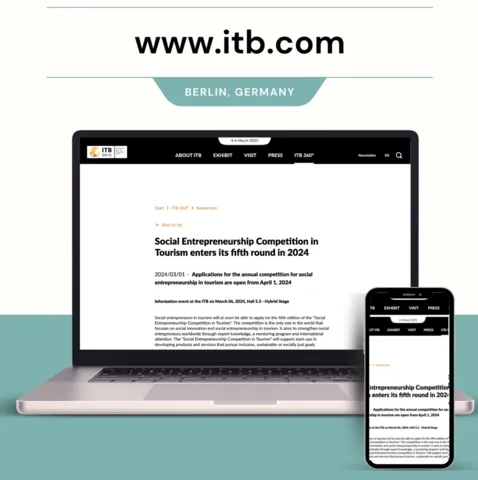
ITB Berlin:
Social entrepreneurship competition in tourism enters its fifth round in 2024.
Featured news at www.itb.com
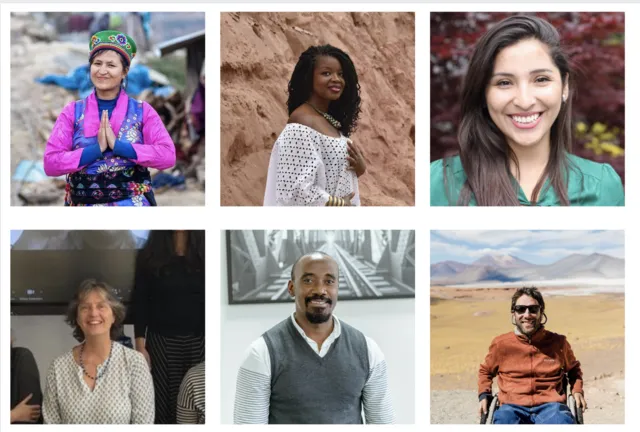
Meet the 2022 Winners
See the featured initiatives - 25 shortlisted, 10 finalists, and the winners of the 2022 Competition.
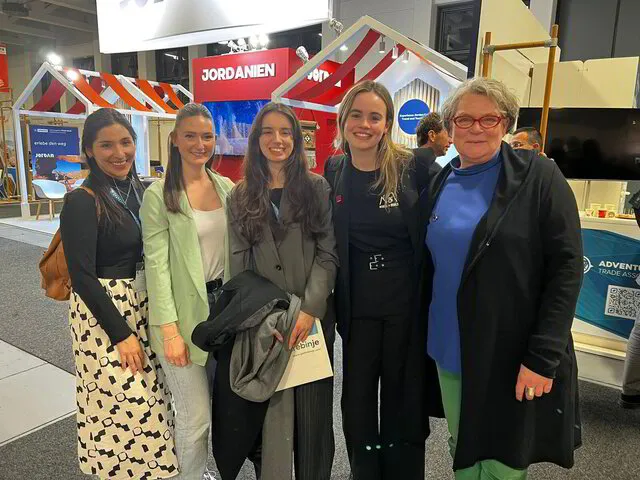
2023 & 2024 update
Our team and winners visited ITB Berlin (7-9 March 2023). Read what is coming up for the Competition!
Why Join The Competition?
International Community
We have a network of entrepreneurs from more than 60 countries who are interested in social innovation and tourism, just like you.

Mentoring & Coaching
All ten finalists receive 10- weeks of both one-on-one and peer-to-peer support from our expert network of Mentors.

Global Network & Exposure
The Competition is powered by strong industry partners providing resources and a relevant reach for the featured initiatives.
Prizes &
Recognition.
Each year, the Competition partners offer tangible and intangible prize fund to support the winning social entrepreneurs.
Who is the Competition for?
The focus of the competition is to provide strong support for social tourism entrepreneurs and their efforts to help to transform the sector and shape a sustainable future for tourism in their destination. There are no demographic or geographical limitation for participants.
All entries must fulfil just the following three criteria:
Related to tourism
Support the united nations' sustainable development goals (sdgs) – (sdgs) – every application must choose no more than 3 sdgs and show how their initiative is supporting them., social or environmental mission at the core of business plan.
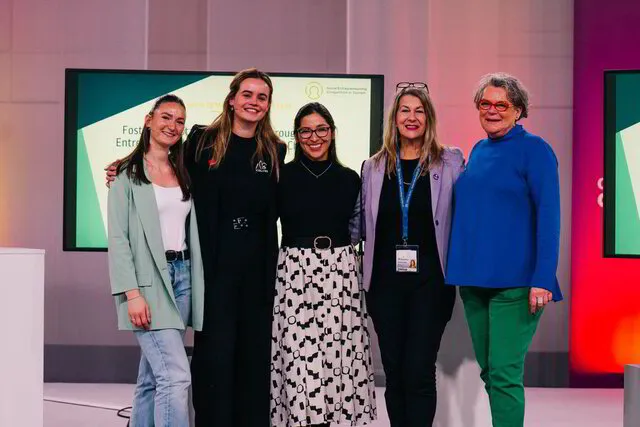
2024 Competition Timeline

What is in it for you?
*The full prize list for the 2024 will be updated regularly. Check this page for news.
For the 25 shortlisted entrepreneurs:
✔️ Access to specialized eLearning Courses & Online Trainings from Teejit (value 11 000 EUR)
✔️ Feedback from leading industry experts.
✔️ Exposure via our channels and strong partners network.
✔️ Amadeus: 1 slot for the next edition of Travel4Impact program for one of the shortlisted participants:
- Consideration of the finalists for the next cycle of Travel4Impact program with the objective to have at least 1 shortlisted candidate of the Growth Track selected to join the Travel4Impact program in 2025 (subject to company officially applying to the program and meeting profile and program admission criteria)
For the 10 finalists:
✔️ 8 weeks of 1-on-1 and peer-to-peer coaching for finalists by selected international Mentors .
✔️ Featured placement on the Travel Massive newsletter and socials for all finalists (100k+ combined reach)
✔️ Additional feature in Press Releases and all relevant channels (ours and our partners)
✔️ Additional visibility on Lufthansa City Center B2B and B2C media channels
✔️ 1h expert session with Amadeus for startups team for up to 3 finalists of each track:
- Launch Track: 1 hour session with Amadeus Launchpad team for 1 to 3 finalists. Timing: any time in 2025.
- Growth Track: 1 hour session with Amadeus Ventures team for 1 to 3 finalists. Timing: any time in 2025.
For the winners:
✔️ €3000 prize fund for the first and second place winners in Launch and Growth Track – provided by Neusta
✔️ 3x2 tickets to ITB Berlin 2025 for the first place winners (valued ~$594)
✔️ Featured placement on Travel Massive for the first prize winners (valued $500)
✔️ 3 Explainer Videos from Teejit (valued €3000 each)
✔️ Visibility of winners in Amadeus channels in Q4 2024.
- 1 blog post about competition and its winners in Insights section
- 1 carrousel featuring the competition and its winners in our social media
- Link to the blog post or dedicated page in the Social Responsibility section of Amadeus.com
2024 Jury
Our jury members hail from all different parts of the tourism industry – and the world!
Social Entrepreneurship at ITB Berlin 2024
In March 2024, our panel discussion "Social Enterprises Driving Positive Impact in Tourism" took the stage of ITB Berlin.
Many thanks to all our partners who joined:
- Dr. Neal Bermas, Founder & Chairman STREETS International
- Carole Carlson, Professor of the Practice at Brandeis University, USA
- Audrey Mourguiart, Head of Social Innovation at Amadeus
- Michel Visser, Head of Societal Impact at Booking.com
- Paola Vulterini, Leader of Valueable network | Assoziazione Italiana Persone Down
Videos From Previous Editions:
Social Entrepreneurship at ITB Berlin 2023
Moderator: Prof. Dr. Claudia Broezel – founder of the Social Entrepreneurship Competition
Keynote: Prof. Dr. Carole Carlson – Brandeis University (USA)
Guests: Joanna Gruau – Wheel The World (USA) and Paola Sota – Ancestral Teachers (Peru)
Guest student: Eyleen Zimmermann, Master Student at HNEE (Germany)
2022 Pitch Contest
Livestream of the 2022 Pitch Competition and Award Ceremony for the Social Entrepreneurship Competition in Tourism.
On 28th of November 2022, ten finalists were part of the online Pitch Competition and the winners were chosen live by the Jury Members.
Moderator: Kevin O’Shaughnessy – Founder, CityHook
Meet The 2022 Partners
Meet the partners and the team behind the Social Entrepreneurship Competition in Tourism in 2022.
- TUI Care Foundation
- Travel Massive
- Social Innovation Academy (SINA)
- Eberswalde University for Sustainable Development
- STREETS International
Social Entrepreneurship Competition in Tourism at ITB Berlin 2024
- Dr. Neal Bermas, Founder & Chairman STREETS International,
- Carole Carlson, Professor of the Practice at Brandeis University, USA,
- Audrey Mourguiart, Head of Social Innovation at Amadeus,
- Paola Vulterini, Leader of Valueable network | Assoziazione Italiana Persone Down.

8 TOURISM SOCIAL ENTREPRENEURS AND THEIR ROLE IN ACTIVATING THE SDGS – Contributions by Karla Boluk
Fair Trade Tourism as an approach to support and build tourism resiliency and sustainability in South Africa
The contemporary context in which tourism operates is rife with challenges. One specific challenge which has occupied my curiosity over the last 10 years has been the social pillar of sustainability. The broad goals of my research program have been to examine how tourism may be a catalyst to enhance the well-being and quality of life of those involved in, or affected by the sector. My scholarship initially began by exploring alternative (to mass/mainstream) forms of tourism. My intention in my scholarly pursuits has always been to explore the potential of tourism as a social-cultural force as initially discussed by Higgins-Desbiolles (2006). My graduate research examined the emergence of a certification called Fair Trade Tourism in South Africa (FTTSA) and its felt impacts on communities supporting ethical consumption and production. FTTSA was an important certification (and pathway for my research trajectory as I will explain), as the intention was to create benefits (e.g., fair wages, fair working conditions, fair distribution of benefits etc.). Furthermore, the FTTSA certification clearly provided supports for communities who were adversely affected by the segregation laws during the apartheid (1948-1994) and fostered a sustainable and resilient tourism industry.
At the time, there was limited research on fair trade in tourism (see Kalisch 2013; 2010; 2001 as exceptions). As such my research started off as descriptive a.) situating FTTSA certification as different to mainstream tourism approaches (Boluk 2011a; Weeden & Boluk, 2014), the importance of the certification in the context of building a post-apartheid South Africa (Boluk, 2013a; 2013b; 2013c; 2013d), the role of tourism in lifting communities, specifically rural communities out of poverty (Boluk, 2011b; 2011d), the motivations of business owners adopting the certification (Boluk, 2011c), and consumers’ decision-making regarding choosing FTTSA among other tourism products (Boluk, 2011d). Notably, my research determined that South African Fair Trade business owners and managers were effective in the reduction of poverty within their rural communities (Boluk, 2011b). This finding responded to my research goal regarding examining ways tourism may enhance well-being. My time thinking and writing about FTTSA led me to draw attention to ethical consumption as the theoretical framework for a book I co-edited entitled Managing Ethical Consumption in Tourism published by Routledge (Weeden & Boluk, 2014). This book was an outcome of an invitation to organize a session at the American Association of Geographers (AAG) Conference in New York in 2012.
Recognizing the Important Role of Tourism Social Entrepreneurs in Mobilizing Social Outcomes, Progressing Sustainability Interests and Supporting Rural Destination Development
Following my data collection in South Africa, I returned to the University of Otago in Dunedin, New Zealand to complete my doctorate. While analysing my data, using Critical Discourse Analysis, I became aware of the important role of the entrepreneurs I had interviewed. Specifically, my analysis revealed their roles in facilitating improved development outcomes via tourism, by fostering democracy, enhancing community outcomes, and contributing to positive transformations post-apartheid (Boluk 2011a; 2011c). Notably, upon a deeper analysis of my data I began to recognize their work as important responses considering government deficiencies and market gaps (Boluk, 2011c; 2011b; Boluk & Aquino, 2021). This understanding led me to recognize my informants as social entrepreneurs which was a significant gap in the tourism literature. Some of the social contributions recognized in my work drew attention to business owners who created employment opportunities and shared benefits with their communities (Boluk, 2011b; Boluk & Mottiar, 2014).
We endeavoured to better understand the motivations of tourism social entrepreneurs. We learned lifestyle motives, acknowledgement, and generating profit, were also centred, leading us to believe perhaps their motivations were murkier than we originally thought (Boluk & Mottiar, 2014); since the literature has typically identified social entrepreneurs as characteristically superior in contrast to conventional entrepreneurs. While recognizing the various ways tourism social entrepreneurs are referred to for example, community leaders, ambassadors, or volunteers (Boluk & Mottiar, 2014) we noted that characterizing such individuals as tourism social entrepreneurs in the literature would better allow us to advance our thinking on these individuals and specifically understand how they contribute to social value creation (Mottiar & Boluk, 2017).
Moving beyond motivational explorations, my research took a more critical turn recognizing the important work of tourism social entrepreneurs in their contributions to sustainability progress and outcomes. Recognizing the situational context of the social entrepreneurs I interviewed in South Africa, specifically responding to inefficiencies on behalf of the local government, I began to realize the power of their efforts in challenging capitalism (Boluk, 2011b) which was largely unattended to in the scholarship. I moved on, with my colleague Ziene Mottiar, to better understand how social entrepreneurs fit into the tourism discourse. Specifically, with this work we were interested in examining how social entrepreneurs were not only relevant for scholars interested in entrepreneurship, but mutually of interest to those spending time thinking about issues on destination development, relationships between stakeholders, tourism policy, and sustainability (Mottiar & Boluk, 2017).
Another important avenue of exploration was using positive theory as a theoretical framework in an exploration with Carol Kline and a member of her team. Our analysis drew attention to the importance of value creation for tourism social entrepreneurs, beyond revenue generation supporting sustainability. Specifically, we found tourism social entrepreneurs leveraged their networks which they identified as a key strategy. Examining the process of social entrepreneurship, we analysed how food social entrepreneurs in North Carolina created value in their communities. We learned they created value by providing a voice for farmers involved, providing healthy alternatives, fostering education, minimizing environmental impacts; thereby supporting sustainability efforts, and striving to foster community (Kline, Boluk & Shah, 2017). This work made a valuable contribution to the limited literature on food tourism social entrepreneurship.
Recognizing the mutual interests of these two scholarly teams, we amalgamated and designed a cross-case analysis of our data sets in South Africa, Ireland, and North Carolina. Upon engaging in a reanalysis of our data sets side by side, we emphasized the important roles of tourism social entrepreneurs in rural destination development (Mottiar, Boluk & Kline, 2018). Our cross-case analysis revealed three specific roles of tourism social entrepreneurs specifically in rural areas namely as opportunists, catalysts, and network architects. This theoretical framework offered a way to examine the tourism social entrepreneur (Mottiar et al., 2018). Recognizing the important work of tourism social enterprises and the individuals driving them, a team of us offered an enhanced, mutually beneficial, responsible, and more relevant definition of tourism. Confronting the traditional definitions and approaches to tourism solely centring the tourist, their desires and the economic revenue derived from their actions, our work re-centred our attention on the host communities (Higgins-Desbiolles, Carnicelli, Krolikowski, Wijesinghe & Boluk, 2019). In our explanation of how this way of tourism may be mobilized, we explain it is incumbent upon governments to authorize and prioritize social enterprises in destinations, to ensure benefits are retained locally.
Recognizing the gaps in the tourism social entrepreneurship scholarly literature
Following an invitation to contribute to the Elgar Handbook of Tourism Impacts edited by Stoffelen & Ioannides (2021) I engaged in a deeper analysis of the state of the tourism social entrepreneurship literature. Along with my colleague Richard Aquino, we determined while the concept of tourism social entrepreneurship is gaining attention, an examination of the specific impacts of this stakeholder is rather limited. Accordingly, the aim of our analysis was to examine the impacts of tourism social entrepreneurs and their enterprises guided by Gartner’s (1985) framework describing venture creation, comprising the individual, organization, process, and environment. Our examination revealed the two aspects of Gartner’s (1985) framework receiving the most attention were the individual and organization, and the process and environment have received the least attention in the literature. We recognized tourism social entrepreneur’s efforts in promoting community empowerment, sustainable livelihood development through the reduction of poverty, promotion of sustainability and many of the UN SDGs (although not explicit in the literature), healthy lifestyles and healthy communities, promotion of peace and social justice, cultural heritage preservation, inclusivity through women empowerment (although limited) and engaging youth and senior citizens (again limited), ethical consumption in tourism, and equitable tourism supply chains (Boluk & Aquino, 2021).
Our analysis specifically noted the limited scholarly research exploring diversity and we noted the absence of women tourism social entrepreneurs (Boluk & Aquino, 2021). This is important because we reviewed the lessons learned from the absence of women in the traditional entrepreneurship literature, which reinforces masculine understandings of success-solely emphasising profit (see Cole, 2018; Kimbu, de Jong, Adam, Afenyo, Adeola, Figueroa & Ribeiro, 2021). To avoid history repeating itself, we underscored the importance for future research to uncover the specific impacts of women tourism social entrepreneurs. Building on Higgins-Desbiolles and Monga’s (2020) analysis on women tourism social entrepreneurs we encouraged others to use a feminist ethics of care lens to uncover women’s agency and impacts on their communities. We also noted few studies attending to indigenous tourism social entrepreneurship despite Koh and Hatten’s (2002) work suggesting an increase in the supply of indigenous tourism entrepreneurs particularly in an educational capacity to support sustainability nearly two decades ago. Furthermore, diverse sexual orientations and perspectives from the LGBTQIA+ community regarding their role as tourism social entrepreneurs or leading tourism social enterprises was absent in our review of the literature (Boluk & Aquino, 2021). We concluded our contribution by noting the contemporary crises we are confronted with necessitates attending to local, gendered, and indigenous perspectives in tourism. Doing so, will allow us to better understand their unique and valuable perspectives in designing and implementing social enterprises supporting sustainability (Boluk & Aquino, 2021).
Critical reflections on the United Nations Sustainable Development Goals
Building on my general sustainability interests, scholarship in the area of transformative education and critical pedagogy (see for example Boluk & Carnicelli, 2019; Boluk, Cavaliere & Duffy, 2019; Carnicelli & Boluk, 2017; 2021) and curiosity regarding the role of tourism in making positive impacts, I engaged in a critical analysis of the United Nations Sustainable Development Goals (SDGs) with my colleagues Christina Cavaliere and Freya Higgins-Desbiolles (Boluk, Cavaliere & Higgins-Desbiolles, 2019). Our initial call for papers and Special Issue (SI) published in the Journal of Sustainable Tourism , served as the inaugural SI focused on the SDGs in tourism (Boluk Cavaliere & Higgins-Desbiolles, 2017; 2019). This was important because the United Nations World Tourism Organization (UNWTO) declared 2017 as the International Year of Tourism signalling the opportunities for tourism to drive change and mobilize the SDGs. Furthermore, it was previously indicated that the SDGs had received limited attention in the scholarly literature (Bramwell, Higham, Lane & Miller, 2017).
The 14 papers presented in our SI considered through a critical lens how the SDGs may be understood and realized from multiple worldviews and disciplinary perspectives. We argued the academy must work more critically to reflect the realities of global communities, as related to, and impacted by, sustainable tourism development. Our SI fostered the next phase of sustainable tourism scholarship pursuing the interconnections of the UN SDGs to tourism theory and praxis, activating critical thinking to analyse and critique the SDGs, and advance sustainability in tourism systems. My main contributions with my fellow guest editors included the presentation of a six-theme conceptual framework in consideration of both reformist and radical pathways to support sustainable transitions in tourism. The six themes we proposed for interrogating transformed futures in tourism include: critical tourism scholarship, gender in the sustainable development agenda, engaging with Indigenous perspectives and other paradigms, degrowth and the circular economy, governance and planning and ethical consumption (Boluk, Cavaliere & Higgins-Desbiolles, 2019).
Considering the role of tourism social entrepreneurs in progressing the United Nations Sustainable Development Goals
Recognizing the emphasis of tourism social entrepreneurs in predominantly southern geographic contexts in the literature, their role in leading change, and as a way to advance my efforts in the area of tourism and the Sustainable Development Goals, I was awarded and I am currently leading a Tri-Council peer-reviewed SSHRC Insight Development Grant . The funded project is exploring the role of tourism social entrepreneurs with a specific interest in the role of women and indigenous tourism social entrepreneurs. The context is focused on two tourism counties in Southern Ontario, Canada. The intention is to understand tourism social entrepreneurs’ responses to the United Nations Sustainable Development Goals and recognize any specific barriers (pandemic related or otherwise) entrepreneurs may face in implementing sustainability activities. Canada is an important context given the limited attention paid to the nation’s sustainability efforts. I expect that the findings will generate new theory on the role of tourism social entrepreneurs in driving the SDGs.
Acknowledgements
I am grateful for the opportunity to have worked with some incredible humans over the trajectory of my career. I would consider many of my collaborator’s dear friends and invaluable supporters, empowering and pushing my thinking. I will also highlight some of the financial support I received, as a graduate student at Otago University, New Zealand, Post-doctoral student at Dalarna University, Sweden, and the support received from the Social Sciences, Humanities Research Council (SSHRC) our federal research funding agency in Canada, which have made and continues to make it possible to contribute to the scholarly research discussed in this chapter.
Written by Karla Boluk, University of Waterloo, Canada Read Karla’s letter to future generations of tourism researchers
Boluk, K., & Aquino, R. (2021). Assessing the Impacts of Tourism Social Entrepreneurs and Enterprises. In. A. Stoffelen & D. Ioannides. Handbook of Tourism Impacts . Edward Elgar.
Boluk, K., & Carnicelli, S. (2019). Tourism for the Emancipation of the Oppressed: Towards a Critical Tourism Education Drawing on Freirean Philosophy. Annals of Tourism Research, 76, 168-179.
Boluk, K., Cavaliere, C., & Higgins-Desbiolles, F. (2019). A critical framework for interrogating the United Nations Sustainable Development Goals 2030 Agenda in Tourism. Journal of Sustainable Tourism, 27(7), DOI 10.1080/09669582.2019.1619748.
Boluk, K., Cavaliere, C., & Duffy, L.N. (2019). A pedagogical framework for the development of the critical tourism citizen. Journal of Sustainable Tourism, 27(7). DOI: 10.1080/09669582.2019.1615928.
Boluk, K., Cavaliere, C., & Higgins-Desbiolles, F. (2017). Call for Papers. Critical thinking to realize sustainability in tourism systems: reflecting on the 2030 sustainable development goals. Journal of Sustainable Tourism , 25(9), 1201-1204.
Boluk, K., & Mottiar, Z. (2014). Motivations of social entrepreneurs: Blurring the social contribution and profits dichotomy. Social Enterprise Journal , 10(1), 53-68.
Boluk, K. (2013a). Fair Trade Tourism. In C. Cater and B. Garrod, The Encyclopedia of Sustainable Tourism . Wallingford: CABI.
Boluk, K. (2013b). Fair Trade Tourism South Africa. In C. Cater and B. Garrod, The Encyclopedia of Sustainable Tourism . Wallingford: CABI.
Boluk, K. (2013c). Fair trade Tourism. In P., Robinson, M., Lueck & S. Smith, Tourism . Wallingford: CABI .
Boluk, K. (2013d). Fair Trade Tourism Case Studies . In Lovelock, B.A. & Lovelock K.M. The Ethics of Tourism: Critical and Applied Perspectives , London: Routledge.
Boluk, K. (2011a). In Consideration of a New Approach to Tourism: A Critical Review of Fair Trade Tourism. The Journal of Tourism and Peace Research , 1(3), 27-37. (Invited)
Boluk, K. (2011b). FTTSA: Consumer Virtue or Moral Selving? Journal of Ecotourism , 10(3), 235-249.
Boluk, K. (2011c). Revealing the Discourses White Entrepreneurial Motivation in Black South Africa. Tourism Planning and Development , 8(2), 199-213.
Boluk, K. (2011d). Fair Trade Tourism South Africa: A Pragmatic Poverty Reduction Mechanism? Tourism Planning and Development , 8(3), 237-251.
Bramwell, B., Higham, J., Lane, B., & Miller, G. (2017). Twenty-five years of sustainable tourism and the Journal of Sustainable Tourism: looking back and moving forward. Journal of Sustainable Tourism, 25(1), 1-9.
Carnicelli, S., & Boluk, K. (2021). A Theory of Care to Socialise Tourism. In F. Higgins-Desbiolles, A. Doering, & B. Bigby. (Ed.). Socialising Tourism . London: Routledge.
Carnicelli, S., & Boluk, K. (2017). The promotion of social justice: learning for transformative education. Journal of Hospitality, Leisure, Sport & Tourism Education (JoHLSTE), 21(Part B), 126-134.
Cole, S. (2018). Gender Equality and Tourism Beyond Empowerment . Wallingford, CABI.
Gartner, (1985). A conceptual framework for describing the phenomenon of new venture creation. The Academy of Management Review, 10 (4), 696-706.
Higgins-Desbiolles, F., & Monga, M. (2020). Transformative change through events business: A feminist ethic of care analysis of building the purpose economy. Journal of Sustainable Tourism , DOI: 10.1080/09669582.2020.1856857.
Higgins-Desbiolles, F., Carnicelli, S., Krolikowski, C., Wijesinghe, G., & Boluk, K. (2019). Degrowing tourism: Rethinking tourism . Journal of Sustainable Tourism , DOI: 10.1080/09669582.2019.1601732
Higgins-Desbiolles, F. (2006). More than an “industry”: the forgotten power of tourism as a social force. Tourism Management , 27(6), 1192-1208.
Kalisch, A. (2013). Fair Trade in Tourism: Critical shifts and perspectives. In A. Holden and D.A. Fennell (Eds.). The Routledge Handbook of Tourism and the Environment. Abingdon: Routledge, 494-504.
Kalisch, A. (2010). Fair Trade in Tourism: A marketing tool for transformation? In S. Cole and N. Morgan (Eds.). Tourism and Inequality: Problems and Prospects. Wallingford, Oxfordshire: CAB International, 85-106.
Kalisch, A. (2001). Tourism as Fair Trade, NGO Perspectives. London: Tourism Concern.
Kimbu, A.N., de Jong, A., Adam, I., Afenyo, E.A., Adeola, O., Figueroa, C., & Ribeiro, M.A. (2021). Recontextualising gender in entrepreneurial leadership. Annals of Tourism Research , 80(2), 1-12.
Kline, C., Boluk, K., & Shah, N. (2017). Exploring social entrepreneurship in food tourism. In P. Sheldon & R. Daniele (Eds.). Social entrepreneurship and tourism . Springer International Publishing.
Koh, K.Y., & Hatten, T.S. (2002). The tourism entrepreneur the overlooked player in tourism development studies. International Journal of Hospitality & Tourism Administration, 3(1), 21-48.
Mottiar, Z., Boluk, K., & Kline, C., (2018). The roles of social entrepreneurs in rural destination development. Annals of Tourism Research , 68, 77-88.
Mottiar, Z., & Boluk, K. (2017). Understanding how social entrepreneurs fit into the tourism discourse. In Sheldon, P. Social Entrepreneurship and Tourism . New York: Springer.
Weeden, C., & Boluk, K. (Ed.). (2014). Managing ethical consumption in tourism . Routledge.
Women’s voices in tourism research Copyright © 2021 by The University of Queensland is licensed under a Creative Commons Attribution 4.0 International License , except where otherwise noted.
Tourism social entrepreneurship in community-based tourism: A case study of Pentingsari tourism village
Published under licence by IOP Publishing Ltd IOP Conference Series: Earth and Environmental Science , Volume 447 , International Conference on Planning towards Sustainability (ICoPS) 2019 6–7 November 2019, Surakarta, Indonesia Citation R R Aji 2020 IOP Conf. Ser.: Earth Environ. Sci. 447 012009 DOI 10.1088/1755-1315/447/1/012009
Article metrics
1413 Total downloads
Share this article
Author e-mails.
Author affiliations
1 Department of Urban and Regional Planning, Universitas Islam Bandung, Jl. Tamansari No. 1, Bandung, Indonesia.
Buy this article in print
Tourism is one of the biggest sources of income in Indonesia. Therefore tourism should be developed at the community level to ensure this flow of money reaches local communities. There are many approaches to tourism, such as community-based tourism, which applies different concepts based on local community characteristics. Tourism social entrepreneurship is a concept of community-based tourism that aims at sustainable community development. Pentingsari Tourism Village is well-known in the Special Region of Yogyakarta as one of the most successful community-based tourism villages. This research aims to describe the application of the Tourism Social Entrepreneurship concept in Pentingsari Tourism Village. The study uses a qualitative case study approach that follows a single holistic model which is generally used to thoroughly explain events. The research shows that Pentingsari Tourism Village uses its human, natural, social, and cultural community capitals to develop its tourism activities. Using these community capitals, the tourism village develops creative tourism solutions to achieve sustainable community-based tourism. Pentingsari Tourism Village can serve as a best practice around the world because itwas able to implement sustainable community development through tourism.
Export citation and abstract BibTeX RIS
Content from this work may be used under the terms of the Creative Commons Attribution 3.0 licence . Any further distribution of this work must maintain attribution to the author(s) and the title of the work, journal citation and DOI.
A post-publication change was made to this article on 16 Sep 2020 to correct figures which were previously not displaying correctly.
To read this content please select one of the options below:
Please note you do not have access to teaching notes, social entrepreneurship in tourism: applying sustainable livelihoods approaches.
International Journal of Contemporary Hospitality Management
ISSN : 0959-6119
Article publication date: 13 June 2016
This paper aims to investigate whether the sustainable livelihoods approach (SLA) enables an analysis of the complex interrelations and interdependencies between social entrepreneurs (SEs), destination communities’ livelihood assets and related transforming structures and processes. SEs in tourism are regarded as drivers for linking destination communities with enterprises, aiming to create economic benefits and livelihoods.
Design/methodology/approach
Data were gathered through participatory action research at a tourism lodge and its foundation, which facilitated agricultural training, and by conducting in-depth interviews with ten key stakeholders. The sustainable livelihoods framework (SLF) served as the theoretical framework.
The SLA enables an analysis of interrelations and interdependencies between various stakeholders and to visualise the way SEs forge the impacts tourism has on livelihoods. The agricultural project did not reach its full potential because of, amongst other factors, competing aims between the profit and non-profit business, resulting in the lack of a clear vision and strategy. Additional challenges were dependency on external funding and a lack of reciprocal communication between the stakeholders involved.
Research limitations/implications
This research is based on one case study, and findings cannot be generalised. Future studies should develop the SLF further, possibly through adaptation and integration of other tools.
Practical implications
The SLF enables researchers to integrate local knowledge and participatory research methods, thus facilitating engagement and learning between different stakeholders.
Originality/value
Through empirical research, this paper adds valuable insights into the applicability of the SLF in the context of social entrepreneurship in tourism.
- Rural development
- Social entrepreneurship
- Participatory action research
- Hospitality management
- Sustainable livelihoods
Acknowledgements
The authors thank all participants involved in this research, especially especially the owner and staff of the lodge and foundation, and the women participating in the agricultural training programme. They further appreciate the contributions of their research colleague Farideh Yousefi in providing valuable information through the previous study. The first author was funded by foundation fiat panis, Ulm, Germany. The larger research project led by the second author was funded by the Ministry of Science, Research and the Arts Baden Wuerttemberg, Germany, and the European Social Fund. Finally, they are grateful for the support of their three anonymous reviewers.
Laeis, G.C.M. and Lemke, S. (2016), "Social entrepreneurship in tourism: applying sustainable livelihoods approaches", International Journal of Contemporary Hospitality Management , Vol. 28 No. 6, pp. 1076-1093. https://doi.org/10.1108/IJCHM-05-2014-0235
Emerald Group Publishing Limited
Copyright © 2016, Emerald Group Publishing Limited
Related articles
All feedback is valuable.
Please share your general feedback
Report an issue or find answers to frequently asked questions
Contact Customer Support

What is social entrepreneurship in tourism? G Adventures fouder explains
“If you want all the comforts of home, maybe you should… stay home. Nobody wants you travelling.”
When Bruce Poon Tip, a Canadian businessman and founder of G Adventures , delivers this line during a tourism event in Auckland, his cheeky grin and comedic timing get a round of laughs from the crowd.
Yet, behind the humour is a weighty challenge for most tourists and tourism companies.
From backpacker to founder
It was 1990 and 22-year-old Poon Tip was exploring Asia when he noticed the difference between backpacking and mainstream travel.
“I saw these coaches of people who were not really experiencing the country and I was on a $10-a-day budget, travelling around Asia, staying with local people and travelling on local buses,” he recalled.
“I realised that their experience wasn’t even a real experience, so I came back and I founded G Adventures,” he said, with the goal to offer “organised experiences that were cultural immersion-based, using local transportation, and local accommodation”.
Almost 35 years later, the company is now the world’s biggest small-group adventure travel company taking 200,000 travellers on 750 tours each year. The founding philosophy and focus on social entrepreneurship, however, remains unchanged.
It’s also a philosophy Poon Tip thinks the tourism industry is in desperate need of.
The problem with ‘normal’
Current estimates put tourist numbers at 1.5 billion a year and in 2030, it’s forecast to hit 2 billion. It’s a massive number and one many countries rely on economically; especially if they are developing.
“Tourism in the 40 poorest countries is number one or two in terms of foreign exchange in that country,” Poon Tip explains, typically competing with oil for first place.
But in the not-too-distant past, this all stopped, for a while. The pandemic ground tourism to a stubborn halt and, like many other industries, there was much discussion about how to get back to normal.
But Poon Tip wasn’t too eager on “business as usual”.
“The travel industry just before Covid wasn’t so great. Normal wasn’t so great,” he said, referencing the headlines about over-tourism, tourist invasions, flight shaming and locals suing tour companies.
It’s not that tourism itself is bad but rather, the business model, Poon Tip said: one that prioritises amenities (think resorts, restaurants or activities) over the destination.
“When we sell people amenities over the destination, people start booking because they want 5-star accommodation or they want comfort levels or they want distractions like Broadway shows or go-cart tracks or you know, 10 different restaurants, to make sure they can get Italian food and French food and sushi when they’re in another country,” he said.
As a result, the destination becomes secondary or irrelevant, Poon Tip said, illustrating his point with a picture of a cruise ship in Alaska, which had a go-cart track on-board.
“Everything is there for them so they never really felt like they left home.”
Poon Tip isn’t against comfort but said it had been confused for comfort zone, with tourism companies trying to ensure travellers can go abroad without ever feeling foreign.
Covid only heightened this dynamic, he said, as social isolation and reliance on technology “fed our addition to convenience”.
“We are addicted, absolutely to convenience and ease and all the tech we have today makes things easier”.
Comfort-zone lovers should stay home
What about travellers who want to experience the world but don’t want to forgo their favourite coffee order, eating schedule, bedding or hobbies?
The solution is simple to Poon Tip; stay home.
“The reason we’re all in this industry is to show people the world and show people different countries. Don’t you think if you’re in another country you should feel like you’re in another country?” he said.
Ironically, by trying to care for a traveller, tourism companies do them a “great injustice” Poon Tip added, as one can’t remove the discomfort or foreignness of travel without removing its benefits; “a greater sense of self, a greater understanding of our place in the universe but more importantly a greater appreciation of where we come from”.
The danger of tourism’s current model
Reducing travel to an itinerary of amenities or experiences extraneous to the destination isn’t just less rich or rewarding, it’s also dangerous, the G-Adventures founder said.
In fact, it’s “the most dangerous place” the travel industry can be.
Traditionally, if a tourism company in Bali wants to attract customers, it will promote unique attractions and experiences. But if tourism companies begin focusing on universal amenities such as resort chains or shopping malls, hotels or cruises, discounts become a key selling point.
The company rarely bears the cost of these discounts, Poon Tip points out. It’s local residents who feel the squeeze.
“Communities are not welcoming to tourists because they’re not benefiting from them being there, so they get angry,” he explained. This is why, in certain destinations, travellers are told to stay within a resort or hotel complex because locals are restless.
“Of course they’re restless because you’re in there, swallowing mass amounts of natural resources and on the other side of those walls they don’t have access to clean drinking water or medical care.” Poon Tip said.
“They’re upset, they’re not benefiting from you being in their country,” he added, saying this model of amenity-driven, mass tourism is “just not sustainable”.
However, there is a solution that benefits travellers, local communities and companies; social entrepreneurship.
The idea of social entrepreneurship isn’t new but G Adventures is a global case study for its use within tourism.
“When we get that intersection between extreme poverty and tourism, we can create great things like wealth distribution, poverty alleviation, that people never thought could be possible before,” Poon Tip said.
It all depends on how you capitalise on the value chain created when someone decides to travel.
Hacking the value chain
Since travel is a privilege, it comes with responsibility, which travellers can approach one of two ways, Poon Tip says.
The first way is “mainstream tourism”. This involves booking with tourism providers that are cheap, amenity-rich or owned by non-local people. It looks like visiting Mexico but staying at an all-inclusive resort owned by an American company or travelling to Bali and only eating at cafes owned by Australians. The result is what experts call ”tourism leak” and is why, when a tourist spends US$100 towards a holiday in a developing country, only $5 stays in that country’s economy, according to UNWTO.
The second way is community tourism, which G Adventures describes as “everybody being included in the value chain”.
“When you go on holiday, everyone benefits from you going on holiday,” Poon Tip said, describing it as a “two-way dialogue” between travellers and locals, directly.
“It’s about being mindful of the impact your holiday spending could have and directing that money towards locals, in a way that changes lives.”
Your taxi from the airport could be through a co-op that provides jobs to women in India. Lunch is eaten at a Vietnamese cooking school training street children in hospitality skills. Your tour group stops at a small women-run weaving business that sells authentic crafts, shares culture with tourists and presents an appealing career for young people who would otherwise move to a big city.
“We’ve talked about this at G Adventures for years, that going on holiday could be your form of giving back,” Poon Tip said.
Holidays for good
As wonderful as it would be, the idea of vacations-as-altruism does feel like a stretch. It’s also a convenient pitch for a tourism company founder to make. Surely $4000 is better sent directly to a charity on Costa Rica rather than taking a holiday in Costa Rica?
Poon Tip says yes, donating to charities is impactful but not a reality for younger generations, for three reasons.
“I think the next generation is not just going to give their money to someone because there is too much transparency in business now,” he said, describing how large portions of a donation often go towards administrative costs.
Secondly, younger people want to be more intimately involved with causes and fully understand what someone is going through instead of throwing money at a charity. Thirdly, Poon Tip said social enterprises had more impact, faster.
“Charities are not the ones who are changing the world right now. It’s Bill Gates, it’s Jeff Bezos, Elon Musk before he went weird, Ted Turner,” he said.
While describing vacations as generous feels farfetched, G Adventure’s founding logic does make sense.
If spending money on a trip, why not make that money go further? Why not prioritise local initiatives that, not only benefit local people directly but also offer a more genuine experience of the place and people I’ve come so far to see?
Because, if I’ve travelled for days (as most Kiwis must) to reach a far-flung destination, you can bet I’m not interested in feeling right at home.

- Partners and Fundings
- events & news
- green hotels
- who’s talking about us
Sustainability Champions: Mindset of a Successful Green Hospitality Owner
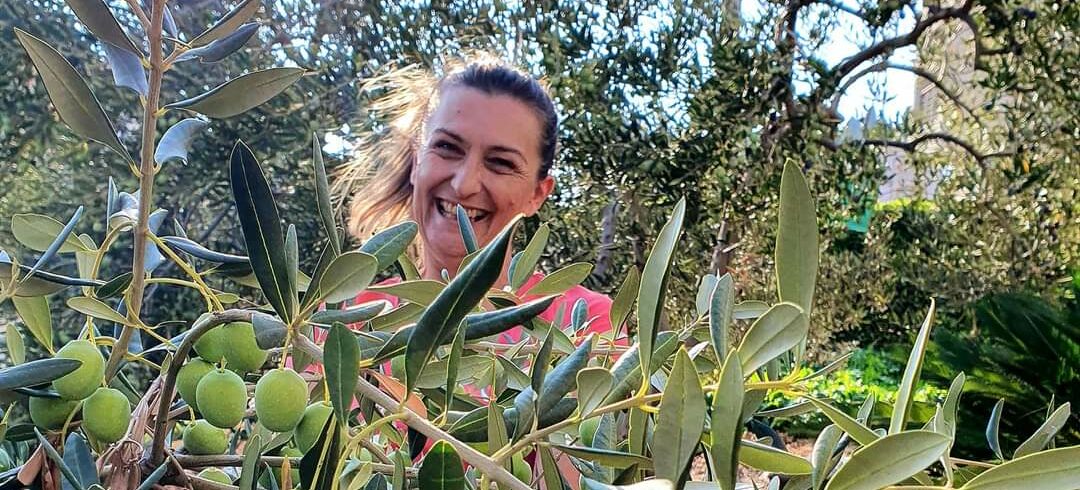
Gordana Piteša is a true sustainability champion and has been an integral part of the Ecobnb community of sustainable hosts for several years. And today it is impossible to imagine sustainable tourism in Split-Dalmatia County without her. Organic food and an awareness of nature have accompanied Gordana since childhood.
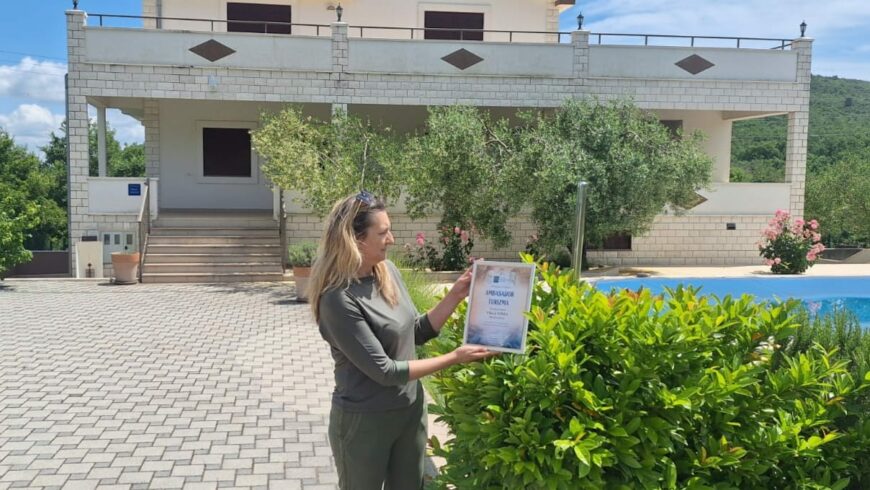
More than 8 years ago, Gordana turned the Villa Vinea into sustainable accommodation . Pioneering thinking, passion and rethinking things have always been at the forefront for the Piteša family. The consistent striving for the good, the genuine and the authentic is part of the hoteliers’ family philosophy. Today, Gordana is running Villa Vinea and the hotel Rotondo in 2nd generation. Being active and doing things differently has always been something Gordana has experienced and been shaped by.
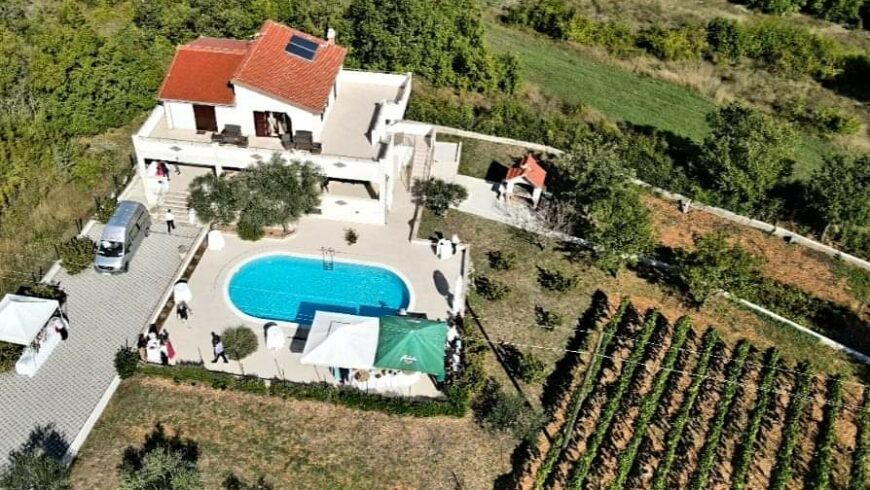
In her free time, Gordana is a passionate nature lover and loves to relax on nearby walking trails overlooking Trogir Bay. She knows where to find hidden gems like nature wells; how valuable home-grown food is and how to prepare it so that the taste is particularly good. Great and priceless – having Gordana at the Ecobnb.
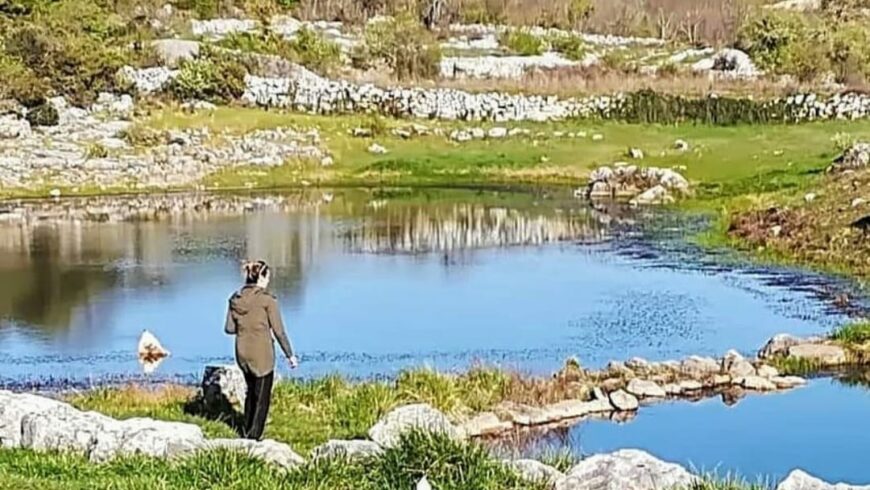
Mission-driven focus
Gordana is a successful eco-entrepreneur. Her mindset blends a mission-driven approach with innovative problem-solving skills and a deep commitment to sustainability and her community’s well-being. By prioritizing collaboration, and cultural sensitivity, Gordana creates tourism experiences that are not only enjoyable for her guests staying at Villa Vinea or Hotel Rotondo , but also beneficial and empowering for the local community in the Prapatnica area.
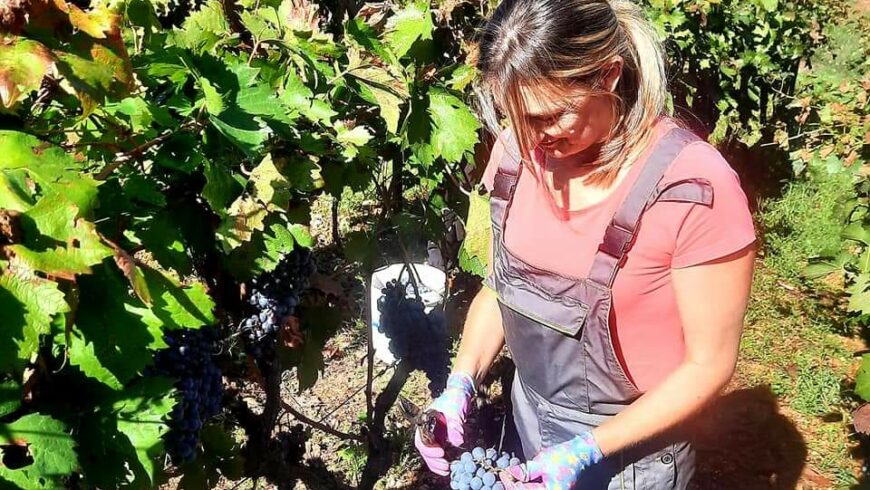
Gordana is deeply motivated by her mission to create positive environmental and social change. One of her main goals is to address cultural preservation and environmental conservation through her accommodation Villa Vinea, where she is growing native species of grapes, garlic (called Šarac), and chickpeas.
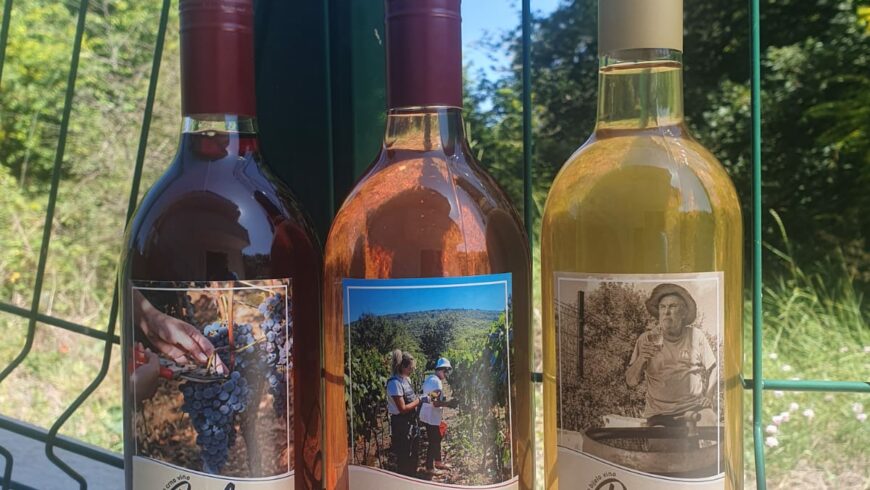
Sustainability as Gordana’s Core Value
Gordana is working closely with community members, employs local people at Hotel Rotondo and supports local artisan businesses by placing their products as gifts for her guests. Sustainability is at the heart of her operations. She strives to minimize negative environmental impacts by waste separation, water and energy-saving solutions and promotes conservation practices by supporting eco-tourism initiatives, such as Dalmatia Green Certification Program and Ambassador of Tourism in Split-Dalmatia County.
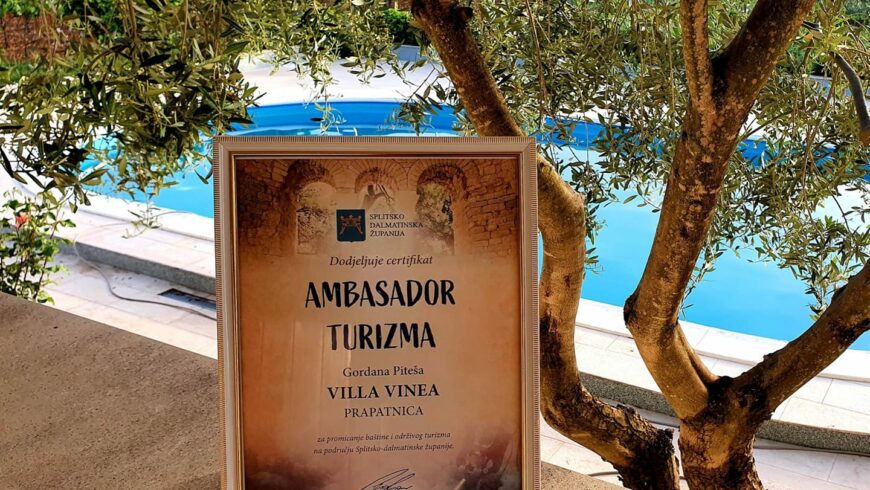
She is innovative in providing authentic and sustainable alternatives to mainstream tourism by promoting cultural immersion experiences such as visiting eco ethno village Škopljanci Radošić.
Adaptability, resilience and empowering employees
The tourism industry is dynamic and quite unpredictable. Gordana Piteša is adaptable and resilient, capable of navigating challenges such as economic downturns and changing market trends. She continuously learns and adapts her strategy to stay relevant and effective.
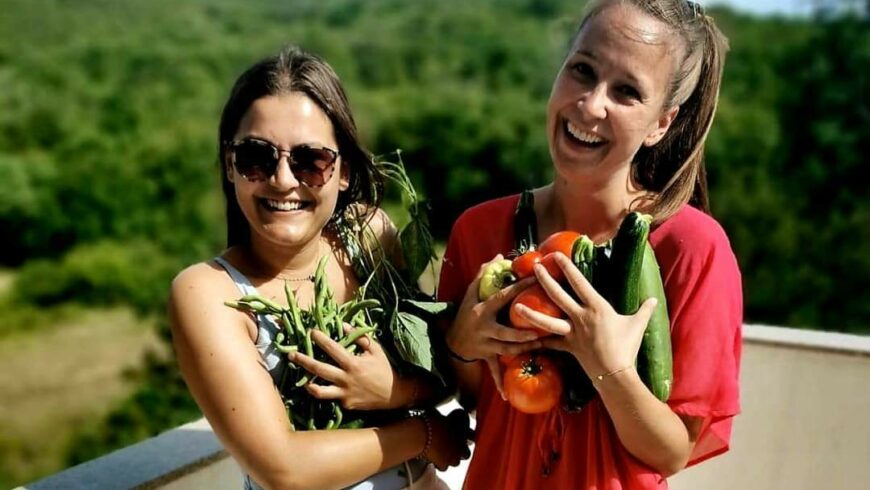
During the COVID times, when mass layouts were a common practice of most hotel managers, Gordana decided to stay with all of her team members. She finds it very important to respect employees, to treat them as family, and to stay together also when times get hard. They have a long-term vision for their impact. While immediate results are important, they focus on creating sustainable change that will benefit future generations, which is proven by a prestigious EU Ecolabel certificate .
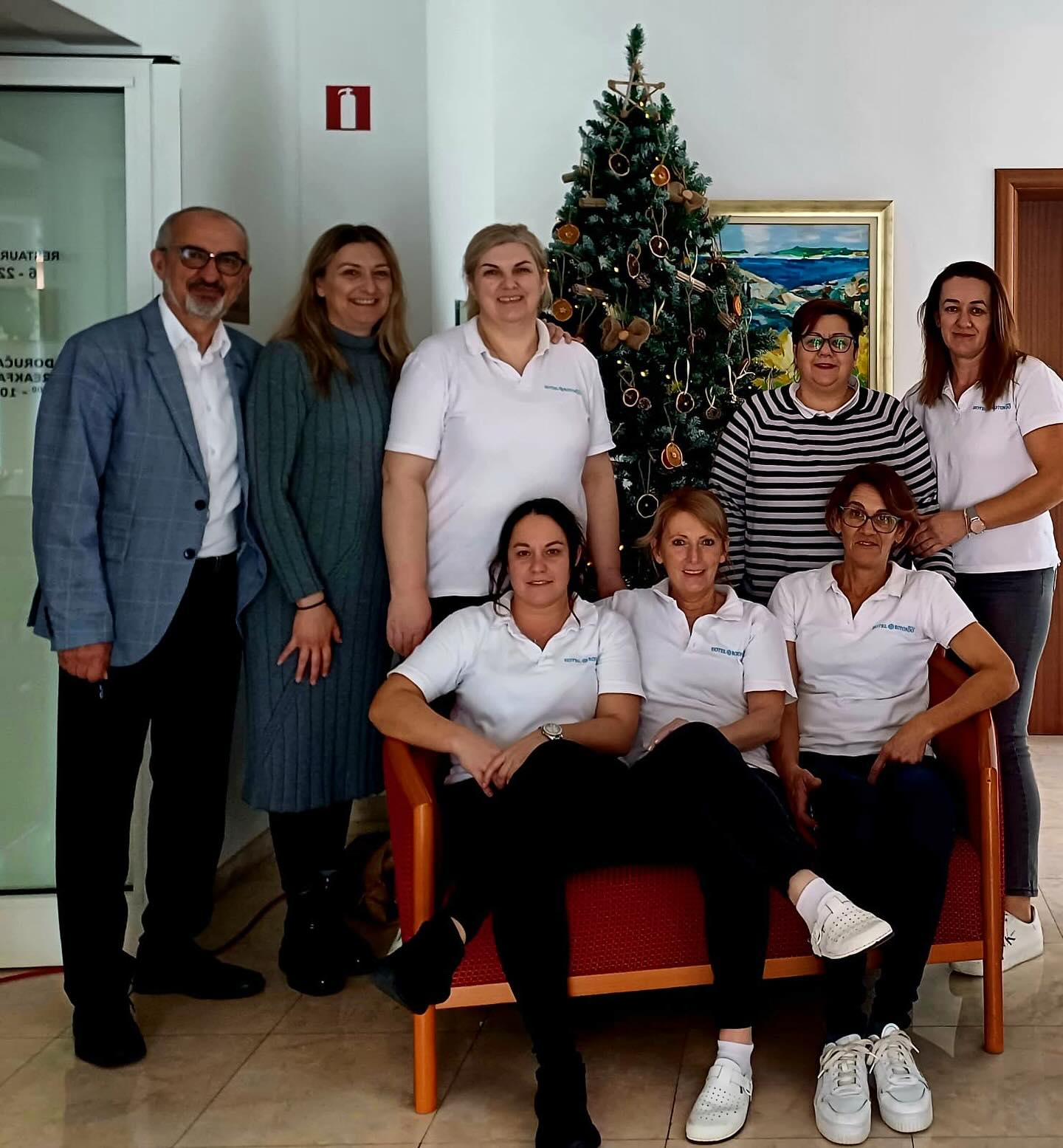
Empathy, Cultural Sensitivity and Partnerships
Empathy and cultural sensitivity are Gordana’s crucial traits as she deeply respects local culture and tradition, from coastal Trogir all the way to Dalmatian hinterland. She ensures that her initiatives honor and preserve Dalmatian cultural heritage. She also engages in programs that support young entrepreneurs on their career paths. At the moment, she is hosting a young artist from North Macedonia within the Erasmus for Young Entrepreneurs program, who is creating practical and eco-friendly gifts for Villa Vinea’s guests.
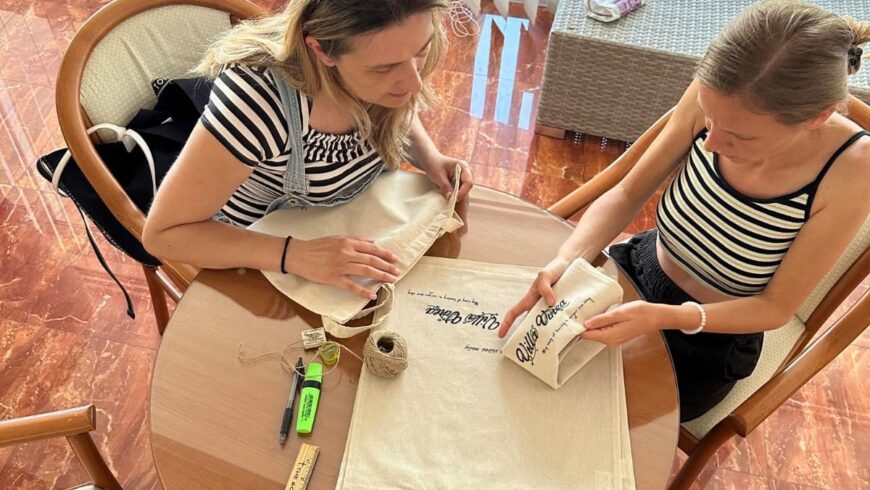
Gordana builds strong partnerships with the Croatian Chamber of Commerce, Split-Dalmatia county authorities, and Association Sunce Split to achieve her social and environmental goals. These partnerships often provide her with essential support and resources, and help her to spread her voice for greener tourism.
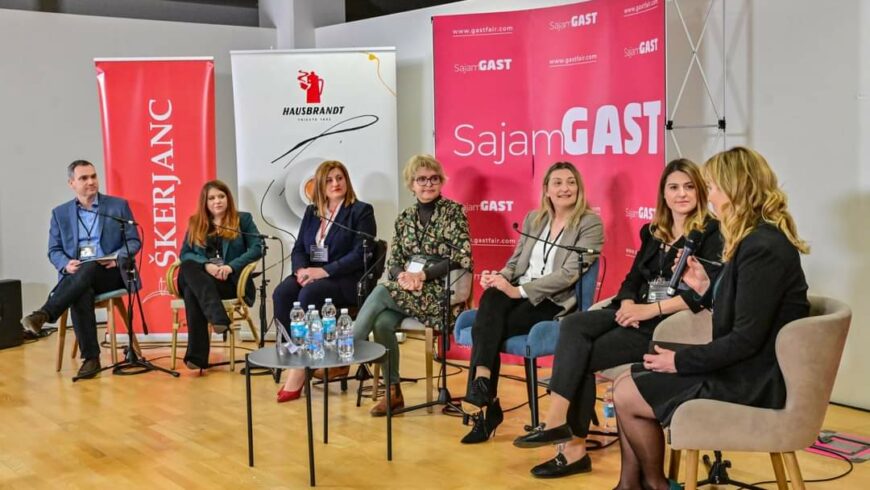
Nowadays, successful eco-entrepreneurs in tourism possess a distinct mindset that combines business acumen with a deep commitment to social and environmental impact. Gordana Piteša is one of the Dalmatian sustainability champions working with great passion, commitment, and ethical leadership style. Let her story inspire you to work towards a positive change.
Book your stay here

You might also like
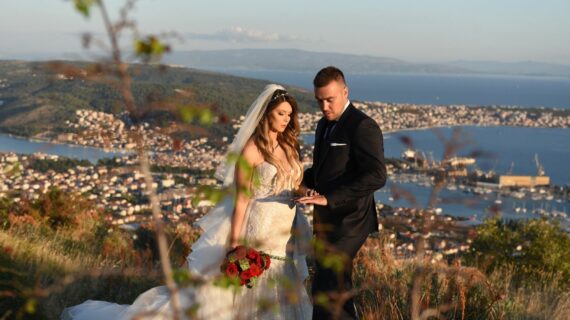
Villa Vinea: a romantic organic wedding villa in Croatia
If you’re dreaming of hosting your wedding in a sun-filled location in Dalmatia with ultimate exclusivity and accommodation as a given, choosing a Villa Vinea is your ideal scenario Weddings simply don’t come much more gorgeous than this Dalmatian celebration captured exquisitely. Confirming once more that this special part of Central Dalmatia really is the […]
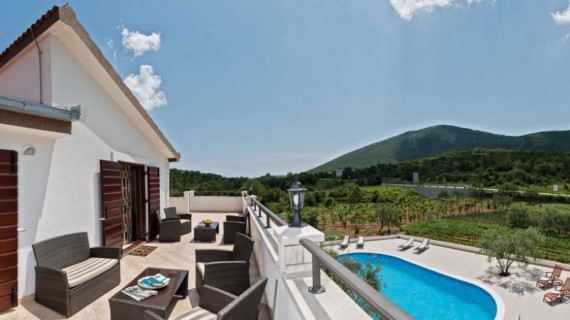
A portrait of vineyard eco villa in inland Dalmatia
Vineyard eco villa Villa Vinea is ideal for a countryside getaway in Dalmatia where everything revolves around organic wine. Would you like to make your cozy stay also meaningful? Check out 5 top reasons why your next eco-friendly holidays should be in Dalmatian hinterland: 1. Stay at the top location, close to the Trogir UNESCO Heritage Site and […]
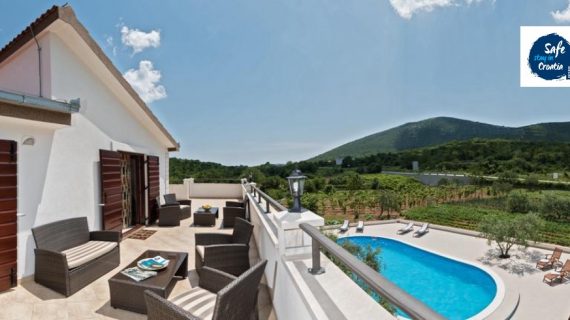
Top Social Distancing Villa Escape in Dalmatian Hinterland
Most people think of beaches and islands when they think of Dalmatia, Away from the coast lies one of Europe’s most intriguing and lesser-known destinations, called Dalmatian hinterland or Inland Dalmatia. Its scenic wonders and varied cultural heritage are truly a fascinating hidden gem in Croatia. Traditions dating back hundreds of years, pristine natural beauty, no […]
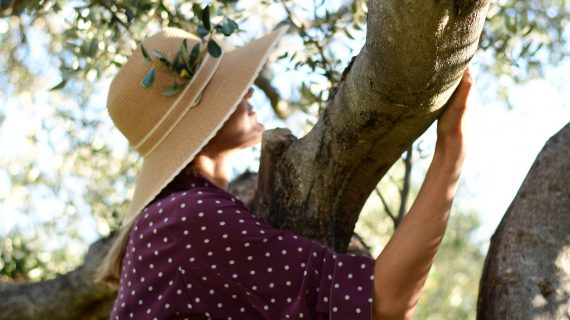
Sustainable Christmas gifts: Adopt an olive tree in Dalmatia
Experience one of the most flavorful aspects of Croatian culture. Adopt an olive tree in Dalmatia for a year, support a sustainable farmer and make a positive impact. Gift an olive tree this Christmas Christmas is coming and now is the perfect time to adopt an olive tree in Dalmatia. Spoil a friend or family […]
.jpg)

BUS 390c/ECON 288 – Social Entrepreneurship and Sustainable Development in Cuba
Four credits, exp, gl 1 week in cuba, 3 weeks on campus professors emily landry and jim casey.
BUS 390c/ECON 288 offers an opportunity for international, interdisciplinary, and experiential learning in Cuba. Students will spend the first week on campus learning about the history of economic development in Cuba and the recent introduction of market reforms which are compatible with global trends toward social entrepreneurship (e.g., Certified B Corps and Benefit Corporations). In week two, students will travel to Havana and learn from Cuban economists, marine scientists, tourism experts, and entrepreneurs who are shaping policy and practice in Cuba's emerging economy. We will collaborate with students and faculty at the University of Havana on service-learning projects related to coastal preservation and sustainable development. We will engage with experts in areas of marine science, political economy, and social entrepreneurship. For the final two weeks, we will return to campus and students will complete multimedia projects that illuminate challenges and opportunities of sustainable economic development and social entrepreneurship in and near Havana. Students will present their final projects to the Washington and Lee community at the Spring Term Fair.
Program fee (Paid to W&L): $3,012 Includes programming, room, nearly all meals, fees, most in-country transportation.
Additional costs: airfare, a few meals (~1 lunch, ~1 dinner), cell phone, spending money, passport, and visa fees (if applicable).
For further details please contact professors Landry ([email protected]) and Casey ([email protected])
Please click the "Start New Application" button to start an application. Please click the "Resume Application" button to access an application you've already started. Please do not open multiple applications for the same program.
Start New Application OR Resume Application
Applications open October 5th, 2023
Entrepreneurship in Tourism
- Living reference work entry
- Latest version View entry history
- First Online: 02 September 2023
- Cite this living reference work entry

- Zhaoping (George) Liu 3 &
- Cathy A. Enz 4
19 Accesses
Entrepreneurship is a young field of study without a commonly accepted definition. Generally, the term denotes creation of new businesses. It is described as “the scholarly examination of how, by whom, and with what effects opportunities to create future goods and services are discovered, evaluated, and exploited” and “involves the study of sources of opportunities; the processes of discovery, evaluation, and exploitation of opportunities; and the set of individuals who discover, evaluate, and exploit them” (Shane and Venkataraman 2000 : 218).
History and Evolution
Entrepreneurship studies identify several milestones (Cooper 2003 ). The first entrepreneurship course at Harvard Business School was offered in 1947. In 1948, the first conference on small businesses was held in Switzerland. The International Council for Small Business was originated from a conference at the University of Colorado in 1956. The popular entrepreneurship conference, The Babson Research Conference,...
This is a preview of subscription content, log in via an institution to check access.
Access this chapter
Institutional subscriptions
Cooper, A. 2003. Entrepreneurship. In Handbook of entrepreneurship research , ed. Z. Ács and D. Audretsch, 21–34. Boston: Kluwer.
Google Scholar
Fu, H., F. Okumus, K. Wu, and M. Köseoglu. 2019. The entrepreneurship research in hospitality and tourism. International Journal of Hospitality Management 78: 1–12.
Article Google Scholar
Li, L. 2008. A review of entrepreneurship research published in the hospitality and tourism management journals. Tourism Management 29: 1013–1022.
Mottiar, Z. 2016. Exploring the motivations of tourism social entrepreneurs. International Journal of Contemporary Hospitality Management 28: 1137–1154.
Sarasvathy, S., N. Dew, R. Velamuri, and S. Venkataraman. 2003. Three views of entrepreneurial opportunity. In Handbook of entrepreneurship research , ed. Z. Ács and D. Audretsch, 141–160. Boston: Kluwer.
Chapter Google Scholar
Shane, S., and S. Venkataraman. 2000. The promise of entrepreneurship as a field of research. Academy of Management Review 25: 217–226.
Solvoll, S., G. Alsos, and O. Bulanova. 2015. Tourism entrepreneurship – Review and future directions. Scandinavian Journal of Hospitality and Tourism 15 (supplement 1): 120–137.
Download references
Author information
Authors and affiliations.
Singapore Institute of Technology, Singapore, Singapore
Zhaoping (George) Liu
Cornell University, Ithaca, USA
Cathy A. Enz
You can also search for this author in PubMed Google Scholar
Corresponding author
Correspondence to Zhaoping (George) Liu .
Editor information
Editors and affiliations.
School of Hospitality Leadership, University of Wisconsin-Stout, Menomonie, WI, USA
Jafar Jafari
School of Hotel and Tourism Management, The Hong Kong Polytechnic University, Hong Kong, Hong Kong
Honggen Xiao
Section Editor information
Makerere University Business School, Kampala, Uganda
Peter U. C. Dieke PhD
Rights and permissions
Reprints and permissions
Copyright information
© 2023 Springer Nature Switzerland AG
About this entry
Cite this entry.
Liu, Z.(., Enz, C.A. (2023). Entrepreneurship in Tourism. In: Jafari, J., Xiao, H. (eds) Encyclopedia of Tourism. Springer, Cham. https://doi.org/10.1007/978-3-319-01669-6_70-2
Download citation
DOI : https://doi.org/10.1007/978-3-319-01669-6_70-2
Received : 20 April 2021
Accepted : 20 October 2022
Published : 02 September 2023
Publisher Name : Springer, Cham
Print ISBN : 978-3-319-01669-6
Online ISBN : 978-3-319-01669-6
eBook Packages : Springer Reference Business and Management Reference Module Humanities and Social Sciences Reference Module Business, Economics and Social Sciences
- Publish with us
Policies and ethics
Chapter history
DOI: https://doi.org/10.1007/978-3-319-01669-6_70-2
DOI: https://doi.org/10.1007/978-3-319-01669-6_70-1
- Find a journal
- Track your research

40 Facts About Elektrostal
Written by Lanette Mayes
Modified & Updated: 01 Jun 2024
Reviewed by Jessica Corbett

Elektrostal is a vibrant city located in the Moscow Oblast region of Russia. With a rich history, stunning architecture, and a thriving community, Elektrostal is a city that has much to offer. Whether you are a history buff, nature enthusiast, or simply curious about different cultures, Elektrostal is sure to captivate you.
This article will provide you with 40 fascinating facts about Elektrostal, giving you a better understanding of why this city is worth exploring. From its origins as an industrial hub to its modern-day charm, we will delve into the various aspects that make Elektrostal a unique and must-visit destination.
So, join us as we uncover the hidden treasures of Elektrostal and discover what makes this city a true gem in the heart of Russia.
Key Takeaways:
- Elektrostal, known as the “Motor City of Russia,” is a vibrant and growing city with a rich industrial history, offering diverse cultural experiences and a strong commitment to environmental sustainability.
- With its convenient location near Moscow, Elektrostal provides a picturesque landscape, vibrant nightlife, and a range of recreational activities, making it an ideal destination for residents and visitors alike.
Known as the “Motor City of Russia.”
Elektrostal, a city located in the Moscow Oblast region of Russia, earned the nickname “Motor City” due to its significant involvement in the automotive industry.
Home to the Elektrostal Metallurgical Plant.
Elektrostal is renowned for its metallurgical plant, which has been producing high-quality steel and alloys since its establishment in 1916.
Boasts a rich industrial heritage.
Elektrostal has a long history of industrial development, contributing to the growth and progress of the region.
Founded in 1916.
The city of Elektrostal was founded in 1916 as a result of the construction of the Elektrostal Metallurgical Plant.
Located approximately 50 kilometers east of Moscow.
Elektrostal is situated in close proximity to the Russian capital, making it easily accessible for both residents and visitors.
Known for its vibrant cultural scene.
Elektrostal is home to several cultural institutions, including museums, theaters, and art galleries that showcase the city’s rich artistic heritage.
A popular destination for nature lovers.
Surrounded by picturesque landscapes and forests, Elektrostal offers ample opportunities for outdoor activities such as hiking, camping, and birdwatching.
Hosts the annual Elektrostal City Day celebrations.
Every year, Elektrostal organizes festive events and activities to celebrate its founding, bringing together residents and visitors in a spirit of unity and joy.
Has a population of approximately 160,000 people.
Elektrostal is home to a diverse and vibrant community of around 160,000 residents, contributing to its dynamic atmosphere.
Boasts excellent education facilities.
The city is known for its well-established educational institutions, providing quality education to students of all ages.
A center for scientific research and innovation.
Elektrostal serves as an important hub for scientific research, particularly in the fields of metallurgy , materials science, and engineering.
Surrounded by picturesque lakes.
The city is blessed with numerous beautiful lakes , offering scenic views and recreational opportunities for locals and visitors alike.
Well-connected transportation system.
Elektrostal benefits from an efficient transportation network, including highways, railways, and public transportation options, ensuring convenient travel within and beyond the city.
Famous for its traditional Russian cuisine.
Food enthusiasts can indulge in authentic Russian dishes at numerous restaurants and cafes scattered throughout Elektrostal.
Home to notable architectural landmarks.
Elektrostal boasts impressive architecture, including the Church of the Transfiguration of the Lord and the Elektrostal Palace of Culture.
Offers a wide range of recreational facilities.
Residents and visitors can enjoy various recreational activities, such as sports complexes, swimming pools, and fitness centers, enhancing the overall quality of life.
Provides a high standard of healthcare.
Elektrostal is equipped with modern medical facilities, ensuring residents have access to quality healthcare services.
Home to the Elektrostal History Museum.
The Elektrostal History Museum showcases the city’s fascinating past through exhibitions and displays.
A hub for sports enthusiasts.
Elektrostal is passionate about sports, with numerous stadiums, arenas, and sports clubs offering opportunities for athletes and spectators.
Celebrates diverse cultural festivals.
Throughout the year, Elektrostal hosts a variety of cultural festivals, celebrating different ethnicities, traditions, and art forms.
Electric power played a significant role in its early development.
Elektrostal owes its name and initial growth to the establishment of electric power stations and the utilization of electricity in the industrial sector.
Boasts a thriving economy.
The city’s strong industrial base, coupled with its strategic location near Moscow, has contributed to Elektrostal’s prosperous economic status.
Houses the Elektrostal Drama Theater.
The Elektrostal Drama Theater is a cultural centerpiece, attracting theater enthusiasts from far and wide.
Popular destination for winter sports.
Elektrostal’s proximity to ski resorts and winter sport facilities makes it a favorite destination for skiing, snowboarding, and other winter activities.
Promotes environmental sustainability.
Elektrostal prioritizes environmental protection and sustainability, implementing initiatives to reduce pollution and preserve natural resources.
Home to renowned educational institutions.
Elektrostal is known for its prestigious schools and universities, offering a wide range of academic programs to students.
Committed to cultural preservation.
The city values its cultural heritage and takes active steps to preserve and promote traditional customs, crafts, and arts.
Hosts an annual International Film Festival.
The Elektrostal International Film Festival attracts filmmakers and cinema enthusiasts from around the world, showcasing a diverse range of films.
Encourages entrepreneurship and innovation.
Elektrostal supports aspiring entrepreneurs and fosters a culture of innovation, providing opportunities for startups and business development .
Offers a range of housing options.
Elektrostal provides diverse housing options, including apartments, houses, and residential complexes, catering to different lifestyles and budgets.
Home to notable sports teams.
Elektrostal is proud of its sports legacy , with several successful sports teams competing at regional and national levels.
Boasts a vibrant nightlife scene.
Residents and visitors can enjoy a lively nightlife in Elektrostal, with numerous bars, clubs, and entertainment venues.
Promotes cultural exchange and international relations.
Elektrostal actively engages in international partnerships, cultural exchanges, and diplomatic collaborations to foster global connections.
Surrounded by beautiful nature reserves.
Nearby nature reserves, such as the Barybino Forest and Luchinskoye Lake, offer opportunities for nature enthusiasts to explore and appreciate the region’s biodiversity.
Commemorates historical events.
The city pays tribute to significant historical events through memorials, monuments, and exhibitions, ensuring the preservation of collective memory.
Promotes sports and youth development.
Elektrostal invests in sports infrastructure and programs to encourage youth participation, health, and physical fitness.
Hosts annual cultural and artistic festivals.
Throughout the year, Elektrostal celebrates its cultural diversity through festivals dedicated to music, dance, art, and theater.
Provides a picturesque landscape for photography enthusiasts.
The city’s scenic beauty, architectural landmarks, and natural surroundings make it a paradise for photographers.
Connects to Moscow via a direct train line.
The convenient train connection between Elektrostal and Moscow makes commuting between the two cities effortless.
A city with a bright future.
Elektrostal continues to grow and develop, aiming to become a model city in terms of infrastructure, sustainability, and quality of life for its residents.
In conclusion, Elektrostal is a fascinating city with a rich history and a vibrant present. From its origins as a center of steel production to its modern-day status as a hub for education and industry, Elektrostal has plenty to offer both residents and visitors. With its beautiful parks, cultural attractions, and proximity to Moscow, there is no shortage of things to see and do in this dynamic city. Whether you’re interested in exploring its historical landmarks, enjoying outdoor activities, or immersing yourself in the local culture, Elektrostal has something for everyone. So, next time you find yourself in the Moscow region, don’t miss the opportunity to discover the hidden gems of Elektrostal.
Q: What is the population of Elektrostal?
A: As of the latest data, the population of Elektrostal is approximately XXXX.
Q: How far is Elektrostal from Moscow?
A: Elektrostal is located approximately XX kilometers away from Moscow.
Q: Are there any famous landmarks in Elektrostal?
A: Yes, Elektrostal is home to several notable landmarks, including XXXX and XXXX.
Q: What industries are prominent in Elektrostal?
A: Elektrostal is known for its steel production industry and is also a center for engineering and manufacturing.
Q: Are there any universities or educational institutions in Elektrostal?
A: Yes, Elektrostal is home to XXXX University and several other educational institutions.
Q: What are some popular outdoor activities in Elektrostal?
A: Elektrostal offers several outdoor activities, such as hiking, cycling, and picnicking in its beautiful parks.
Q: Is Elektrostal well-connected in terms of transportation?
A: Yes, Elektrostal has good transportation links, including trains and buses, making it easily accessible from nearby cities.
Q: Are there any annual events or festivals in Elektrostal?
A: Yes, Elektrostal hosts various events and festivals throughout the year, including XXXX and XXXX.
Elektrostal's fascinating history, vibrant culture, and promising future make it a city worth exploring. For more captivating facts about cities around the world, discover the unique characteristics that define each city . Uncover the hidden gems of Moscow Oblast through our in-depth look at Kolomna. Lastly, dive into the rich industrial heritage of Teesside, a thriving industrial center with its own story to tell.
Was this page helpful?
Our commitment to delivering trustworthy and engaging content is at the heart of what we do. Each fact on our site is contributed by real users like you, bringing a wealth of diverse insights and information. To ensure the highest standards of accuracy and reliability, our dedicated editors meticulously review each submission. This process guarantees that the facts we share are not only fascinating but also credible. Trust in our commitment to quality and authenticity as you explore and learn with us.
Share this Fact:

IMAGES
VIDEO
COMMENTS
Case 1 is an example of social enterprise, as the community will directly apply business principles to solve the problem, by making a "diffused hotel". Case 2 is an example of a broader form of social entrepreneurship, where various entrepreneurial activities are initiated in order to frame Lildstrand as a nature-based tourism destination. As such, they demonstrate different community ...
Tourism social entrepreneurship (TSE) is suggested as a market-based strategy to address social problems whilst maximising the benefits and minimising the negative consequences that tourism may provide to host communities. To date, there is limited understanding of how TSE can be a catalyst for sustainable community development.
Tourism social entrepreneurship facilitates the "marriage between altruism and capitalism moving social interventions away from dependency by endeavouring to harness market forces for social aims" (von der Weppen & Cochrane, 2012, p. 498). These idealised views of tourism social entrepreneurship emphasise its potential to transform the ...
2024. The Social Entrepreneurship Competition in Tourism is the first worldwide competition focusing on social innovation and entrepreneurship in tourism and hospitality. Ten finalists will receive invaluable 8-week business mentorship from our expert Mentors and will compete at the final Pitch Contest on 18 November 2024.
As an important emerging topic in recent years, reviews on tourism and hospitality social entrepreneurship (THSE) by theme remain limited. This paper aims to map the current publication trends, reveal the formation path and identify the future research directions of THSE, providing comprehensive and in-depth insight.
Despite the growing social entrepreneurship (SE) literature in other disciplines, the research on tourism social entrepreneurship (TSE) is still in its infancy, and the knowledge has not been explicitly mapped. Moreover, the existing literature consists primarily of descriptive case studies of successful TSE initiatives, and few of them have ...
Social entrepreneurship is a critical tool for the solution of social problems and the achievement of sustainable development. Although social entrepreneurship is not a new topic, tourism, hospitality and events has experienced considerable growth in the last 10 years (Bozhikin et al., 2019 ).
Specifically, tourism social entrepreneurship is defined as "a process that uses tourism to create innovative solutions to immediate social, environmental and economic problems in destinations by mobilizing the ideas, capacities, resources and social agreements, from within or outside the destination, required for its sustainable social transformation" (Sheldon et al. 2017: 7).
Social entrepreneurship has been popularised as a market-based activity with an embedded social purpose aimed at positively transforming communities and society. As a strategy for developing sustainable tourism, social entrepreneurship is promoted as a catalyst for positive community change.
Eco-tourism that employs social entrepreneurship to solve social problems has been noticed can help impoverished and marginalized societies so as the environment. Eco-tourism is one of the sustainable developments in the tourism industry that allows visitors to experience and comprehend the natural beauty and diverse wildlife of the area ...
Recognizing the gaps in the tourism social entrepreneurship scholarly literature. Following an invitation to contribute to the Elgar Handbook of Tourism Impacts edited by Stoffelen & Ioannides (2021) I engaged in a deeper analysis of the state of the tourism social entrepreneurship literature. Along with my colleague Richard Aquino, we ...
Purpose: Social tourism entrepreneurship is an important topic as it can resolve several social issues and generate sustainable community development. This research aims to examine the impact of ...
Tourism social entrepreneurship (TSE) is suggested as a market-based strategy to address social challenges whilst maximising the benefits that tourism may provide to local communities. This paper ...
Social Entrepreneurship and Tourism: Philosophy and Practice. This volume explores the links between the rapidly growing phenomenon of social entrepreneurship (SE) and the international tourism and hospitality industry. This unique industry is particularly ripe for transformation by SE and the book's authors delve deeply into the reasons for ...
Tourism social entrepreneurship is a concept of community-based tourism that aims at sustainable community development. Pentingsari Tourism Village is well-known in the Special Region of Yogyakarta as one of the most successful community-based tourism villages. This research aims to describe the application of the Tourism Social ...
Purpose. This paper aims to investigate whether the sustainable livelihoods approach (SLA) enables an analysis of the complex interrelations and interdependencies between social entrepreneurs (SEs), destination communities' livelihood assets and related transforming structures and processes. SEs in tourism are regarded as drivers for linking ...
Social Entrepreneurship (TIPSE), a network formed to explore and discuss how education and research within higher education can facilitate social entrepreneurship within the tourism and hospitality sectors. !e initial founders of this initiative include three universities and two social enterprises.
Tourism social entrepreneurship can deliver positive economic, social, and environmental outcomes (Sheldon et al., 2017), and provide socially innovative tourism products that are embedd ed in ...
The founding philosophy and focus on social entrepreneurship, however, remains unchanged. It's also a philosophy Poon Tip thinks the tourism industry is in desperate need of.
Nowadays, successful eco-entrepreneurs in tourism possess a distinct mindset that combines business acumen with a deep commitment to social and environmental impact. Gordana Piteša is one of the Dalmatian sustainability champions working with great passion, commitment, and ethical leadership style.
BUS 390c/ECON 288 offers an opportunity for international, interdisciplinary, and experiential learning in Cuba. Students will spend the first week on campus learning about the history of economic development in Cuba and the recent introduction of market reforms which are compatible with global trends toward social entrepreneurship (e.g., Certified B Corps and Benefit Corporations).
Social entrepreneurship, a process of creating social value by innovative uses of resources, has become a topic of substantial interest. For example, the motivations of tourism social entrepreneurs have been examined, calling for studies to investigate how tourism social entrepreneurs interact with other stakeholders (Mottiar 2016 ).
Social Media . Address Ulitsa Korneyeva, 6, Elektrostal, Moscow Oblast, Russia, 144009. City: Elektrostal. Postal: 144009. Administrative region: Moscow Oblast. Country: Russia. 0. About. State Housing Inspectorate of the Moscow Region is located in Elektrostal. State Housing Inspectorate of the Moscow Region is working in Public administration ...
Also, the study highlights the evolving social dynamics among start-up ecosystem actors influenced by cutting-edge technologies. This study contributes to the tourism and hospitality literature and offers practical implications for start-up entrepreneurs, public policymakers, and tourism and hospitality firms.
40 Facts About Elektrostal. Elektrostal is a vibrant city located in the Moscow Oblast region of Russia. With a rich history, stunning architecture, and a thriving community, Elektrostal is a city that has much to offer. Whether you are a history buff, nature enthusiast, or simply curious about different cultures, Elektrostal is sure to ...
Allthishas boosted tourism by 70 percent. This was the first ever Moscow Entrepreneurship Forum. It kicked off Moscow Entrepreneurship Week that will last until 1 June and is expected to become a major business event in the city.
A mix of the charming, modern, and tried and true. See all. Apelsin Hotel. 43. from $48/night. Apart Hotel Yantar. 2. from $28/night. Elektrostal Hotel.